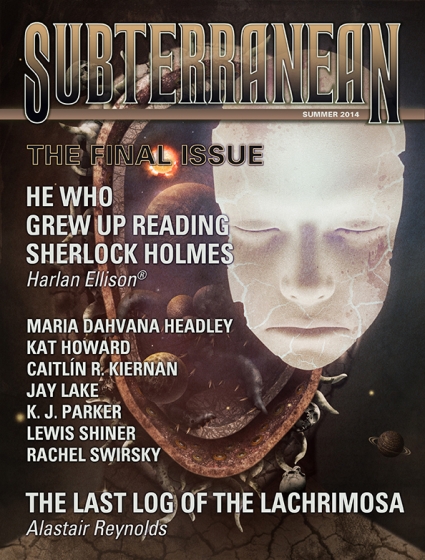Welcome back to the Short Fiction Spotlight, a space for conversation about recent and not-so-recent short stories. In the last installment, I discussed a handful of flash stories from Daily Science Fiction; this time, I want to return to a publication I’ve discussed here a few times before—Subterranean Magazine. Except this turns out to be the last time I’ll be doing so, because the Summer ’14 issue is their last. It’s a real shame, since Subterranean tends to be a great purveyor of dark, weird fiction at lengths other places don’t tend to publish; I’ll miss it quite a bit.
But, as for this last issue: there are nine stories, one posthumous. More or less all of the names represented are regulars, the folks whose work I have looked forward to seeing in these pages—but, space and time being what they are, of the bunch I’ve chosen two stories: “West to East” by Jay Lake and “Grand Jeté (The Great Leap)” by Rachel Swirsky.
The first piece, “West to East,” is a short science fiction story about a two-person crew who’ve crash landed on a planet with 900-knot winds. There’s no hope for getting out; their goal is to be able to transfer their messages and research to the people in orbit awaiting them. On a thematic level, it reminded me quite a lot of Joanna Russ’s We Who Are About to…—in that it seems to be as much a meditation on death and dying as it is a story about any sort of scientific extrapolation. The sfnal set pieces are illustrations of the theme and the concept: the inhospitable storms on the planets’ surface—the natural world, the way of things—are what renders survival an impossibility, but that’s also the way of things.
In the end, the only actions worth doing are getting last words out and seeing something beautiful. There’s something particularly moving about this, considering that “West to East” is a posthumous publication; Jay Lake’s explorations of mortality and meaningful life near the end of his own have a certain depth and richness that make a story like this one shine. While the characters themselves aren’t the focus of the piece—I would argue that they’re primarily blanks, in the sense that the reader can project into their space to experience the thematic drive of the story more than a narrative drive—their experiences are, and those experiences will likely linger for me.
For example, the moment the protagonist gets to see into the clouds for the first time, knowing he is going to die in them: the colors without names and the astounding flora and fauna of the planet are all spread out before him, and that’s something he can appreciate. The last line is the real kicker: “There seemed no reason not to stay in the high, clear air, surfing the beauty of the skies behind our ribbon-eel until something tore free, so I did that thing and smiled.”
It’s a story that’s doing more under the surface than on, and I liked it.
The second piece, Rachel Swirsky’s “Grand Jeté (The Great Leap),” is a novella—which is one of the things I’ll miss about Subterranean: their willingness to publish long stories. But this last one is a good representation of the caliber and intensity of the work they’ve published over the years. “Grand Jeté (The Great Leap)” explores three narratives, all bound together: a young girl dying of cancer, her father the tinkerer who has built an artificial version of her to continue her life, and the artificial version—the “new child”—Ruth. It’s a complex story about loss and survival, thickly woven with Jewish cultural context and history; while the whole “brain-map AI to continue the life of a dying person (or replace them)” trope itself isn’t fresh, the dynamics of this family and their handling of it are.
This story is a long, contemplative one—the action could be condensed to half the space, but the emotional development and resonance couldn’t be. I appreciate the technique Swirsky employs in opening the story with Mara’s narrative and then slowly drifting from her, more and more, as she dies; in the end, she seems like a ghost to Ruth before she does pass on. It’s handled well, with the bare-bones of grief sticking out in Jakub’s section and the rage of loss impossible to ignore in Mara’s—while Ruth’s is a rebirth or a becoming, tinted by the rest but also fresh.
It’s a slow read, and a careful one, that has a lot woven into it about the nature of family and loss: from Jakub’s parents and grandparents to his wife and daughter, there’s a distinct through-line of love being a thing that causes as much pain as it gives succor. Nonetheless, I wouldn’t call it a dark story; the ending note, Ruth’s own stepping out into the world, is uncertain but hopeful. It’s got the same quiet handsomeness as Lake’s piece—and a few of the others in this last issue, actually—in dealing with the idea of death, the process of loss, and sometimes what it takes to survive those things.
Subterranean’s Summer 2014 issue is a good one—I’m sorry to say it’s the last, and sorry to see it go, but it’s a very solid and thoughtful read. I’d certainly give it a look, and while you’re at it, maybe check out some of those back issues, too.
Lee Mandelo is a writer, critic, and editor whose primary fields of interest are speculative fiction and queer literature, especially when the two coincide. She can be found on Twitter or her website.










